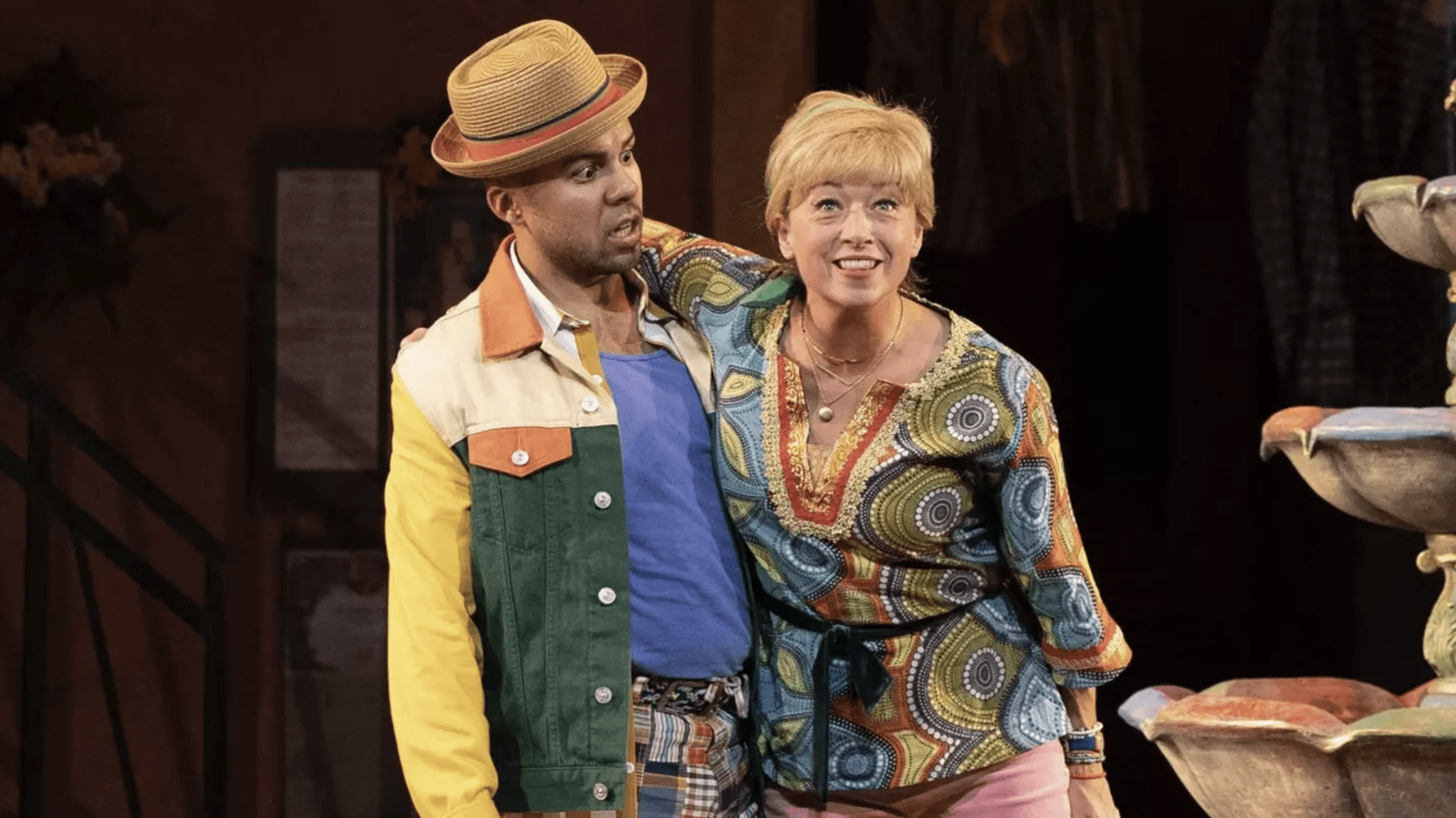SALT LAKE CITY — When I started teaching theatre at a middle school on the west side of Salt Lake City in 2020, the first thing I wanted to know was what exposure my students had to theatre. With the disruption that the pandemic caused to learning and the Title 1 status of my school, I did not know what to expect. I soon learned that virtually none had seen a play. I was delighted when I found that Pioneer Theatre Company had school matinees of their productions, and I plan on taking my students to see professional actors at the highest levels of professionalism and creativity in a wickedly delightful and unconventional performance of Stephen Wrentmore’s adaptation of Molière’s Scapin.
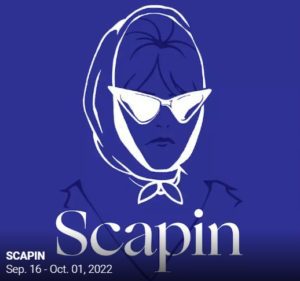
Scapin is a story of long lost children, parents who meddle in the love lives of their children, and a servant name Scapin (pronounced skuh-PAN) who always has an eye out for the chance to make easy money. While the base text has been around for over 350 years, Wrentmore’s adaptation was infused with pop music interludes that spanned the decades from the Monkees to Fleetwood Mac, with some Taylor Swift thrown in. With many references to songs like the Clash’s “I Fought the Law,” I am much younger than the audience members who would appreciate the full suite of pop culture references. But Scapin was still an easily accessible and engaging story that followed the story’s core and hit notes that audiences new and old would appreciate.
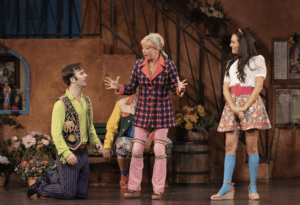
The first thing I noticed was the gorgeous Italian inspired scenic design by Yoon Bae that provided both ample play space for the actors, as well as incredibly satisfying eye candy for the audience. The vivid colors, barrel clay roof tiles and hanging lights set a romantic atmosphere that invited the audience into the lives of the characters. It was such an intricate and impeccably dressed set that my wife and I kept noticing little things during the show and pointing them out to one another with delight. The set included tables, vegetable stands, a fountain, stairs, a pair of store fronts, balconies and (in Act 2) a gelato cart that the actors could interact with in fun and exciting ways. The only disappointing aspect of that design was that often the direction was focused heavily on playing downstage center, or on the fountain. It felt as if there were missed opportunities to play with creative blocking in such a richly textured set.
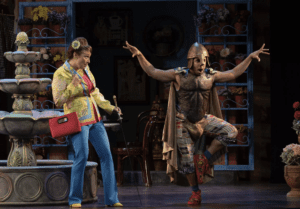
That is not to say that the characters were static. The physicality of the actors was one of the comedic highlights of a very funny show. A prime example of this is the scene where Scapin (played by Kate Middleton) acts as though she is fighting off ruffians from all over the world and is instead simply giving a thorough beating to Geronta (played by Sofia Jean Gomez). The whole sequence is rich with strong actions, including Geronta seeking to escape while in the giant bag and Middleton playing a range of captivating characters as one person.
While not having a great deal of stage time, I was also particularly seized with laughter by Andrea Morales’s portrayal of Hyacintha. Her range, from simpering sap to shrill and shrewish newlywed, was delightful. She was able to whine hilariously in a high pitch that was later mimicked in the performance of her mother Geronta. Morales brought life and humor to a role that would have been easy to make fairly monotonous or overly similar to the other young lovers in the script. Each of Morales’s reactions to the plays unfolding events felt authentic and fresh.
Perhaps my favorite performer was the severe and biting wit of Celeste Ciulla, who played Arganta, the overbearing mother of one of the lovers. Ciulla brought a greatly heightened sense of the stakes to each scene. There is a long exchange where Scapin is swindling a few hundred pistoles from Arganta, and each time Scapin upped the ante, Ciulla was able to believably articulate a character who had just reached the threshold of what she would pay — even to save her own child. Each time, as Arganta was coaxed out of a bit more money, the arc was dynamic and believable in a way that doing this kind of circular bit often misses. It is a testament to the chemistry between actors and the profound understanding of Arganta’s character that Ciulla brought to the stage. Ciulla’s performance was hilarious, and I always anticipated her reentering the space.
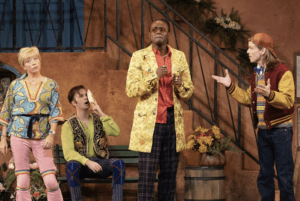
By contrast, while much of the play was truly delightful in its humor, there were some moments that felt like inside jokes only the cast understood. Wrentmore in his director’s note in the program tells the audience that the playfulness of the actors in the rehearsal space was a key goal and that, “I can’t remember so much laughter in the rehearsal room.” There were several times in the play where Middleton or other actors seemed to expect a laugh where there was none. Sometimes improvisers and comic actors discover that what worked in the rehearsal room does not fully translate to the stage, and I felt some of that with this production.
And perhaps the rehearsal room also fostered too much familiarity with the play; I also noticed that at times the bits were so well choreographed that the actors did not seem to be present in the moment of the play. Middleton, especially in the early part of the play, would have a long series of bits that clearly were supposed to happen because of Scapin’s quick thinking. However, instead it felt as if some lines or blocking were delivered simply because that was what had been planned and lacked the spontaneity that strong comic actors need.
Ultimately, Scapin is a beautiful production with a simple story. It is a little heavy on the musical bits and inside jokes; I’m not totally convinced my students would appreciate many of them. However, it has universally a strong technical design, a great script, and lively actors who are clearly having fun with one another. Pioneer Theatre Company’s Scapin largely had me filled with irreverent laughter, and I never felt like I was being swindled by the delightful rebel Scapin.
[box]The Pioneer Theatre Company production of Scapin plays Mondays through Thursdays at 7 PM, Fridays and Saturdays at 7:30 PM, and Saturdays at 2 PM through October 1 at the Simmons Memorial Pioneer Theatre (300 South 1400 East, Salt Lake City). Tickets are $35-46. For more information, visit pioneertheatre.org.[/box]

